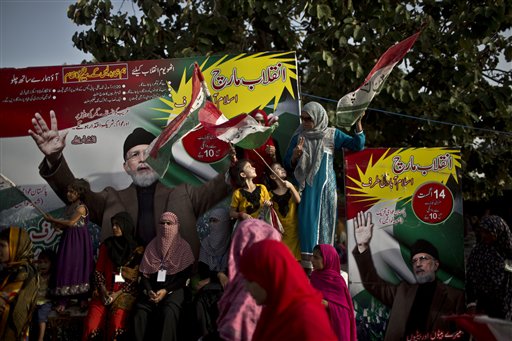ISLAMABAD (AP) — Thousands of protesters demanding Pakistan’s prime minister step down prepared Tuesday to march on parliament in the capital, as authorities beefed up security to prevent possible violence.
The demonstrators, who have camped out in Islamabad in two rallies since last week, are demanding that Prime Minister Nawaz Sharif step down over alleged vote rigging in the 2013 parliamentary elections.
The rallies — with tens of thousands taking part — are led by cricket-star-turned-politician Imran Khan and fiery cleric Tahir-ul-Qadri, who have vowed to keep up the sit-ins until Sharif resigns.
Khan, who heads parliament’s third-largest political bloc, announced Monday that he and his supporters would march into Islamabad’s so-called “Red Zone,” which houses embassies, parliament, diplomatic posts, government offices and the residence of the prime minister and the president.
On Tuesday, he said on Twitter that he himself would lead the march and urged Sharif to resign. Authorities have said they would not allow protesters to enter the “Red Zone” and asked the two opposition leaders to reconsider.
Instead of the march, “we request that Imran Khan and Tahir-ul-Qadri agree to talks with the government,” said Ahsan Iqbal, a senior Cabinet minister.
“Let us sit and find a political solution,” said Iqbal, who was appointed by Sharif to lead the talks with the opposition.
About 30,000 security troops have fanned out across the “Red Zone” and Islamabad ahead of the announced march, police said.
Amid growing tension Tuesday, Pakistan’s army chief Gen. Raheel Sharif met with the prime minister in Islamabad, state-run Pakistan Television said. It did not elaborate.
Khan’s Tehrik-e-Insaf party has been complaining that Sharif’s Pakistan Muslim League-N rigged last year’s elections. Sharif has agreed to set up a judicial commission to probe the allegation but refused to step down.
Khan has said he won’t go home without Sharif’s resignation, setting up a possible violent confrontation.
The standoff has raised fears of political instability in this nuclear-armed country of 180 million, which has largely been ruled by dictators since 1947.
Sharif, himself overthrown in the 1999 coup that brought former army chief Pervez Musharraf to power, has been meeting with top advisers ahead of the rally. The government also has invoked a rarely used article in the constitution allowing the military to introduce martial law if needed.
The Islamabad rallies come as Pakistan’s military is waging a major operation against local and foreign militants in the North Waziristan tribal region bordering Afghanistan. The military said it carried our multiple airstrikes Tuesday in the Khyber and North Wazristan tribal region that killed 48 militants.
Pakistan’s tribal regions are off-limits to journalists, making verifying claims over airstrikes difficult.
Also Tuesday, a roadside bomb struck a school van with children and teachers in Khar, the main town in the northwestern tribal region of Bajur, killing five people, a government administrator said.
No group immediately claimed responsibility for the attack. The Bajur tribal region has seen several military offensives against the Pakistani Taliban and foreign militants in recent years.
___
Associated Press writers Anwarullah Khan in Bajur and Asif Shahzad in Islamabad contributed to this report.

COMMENTS
Please let us know if you're having issues with commenting.